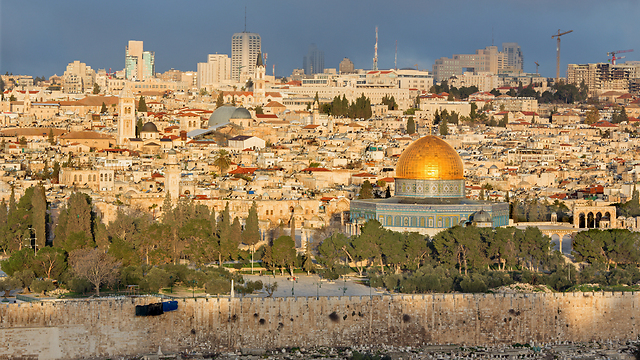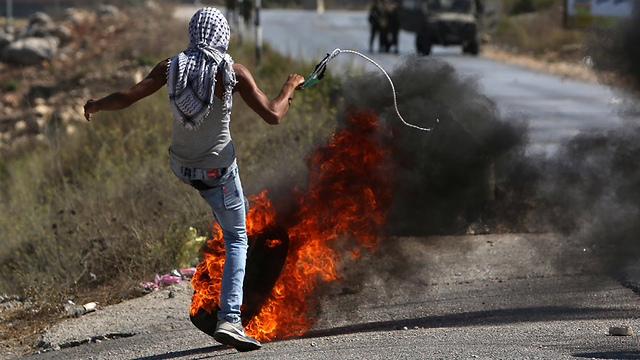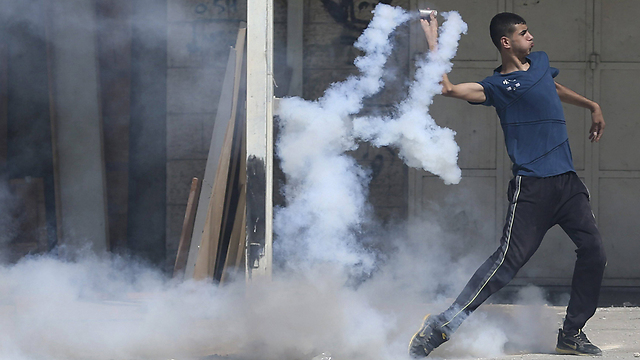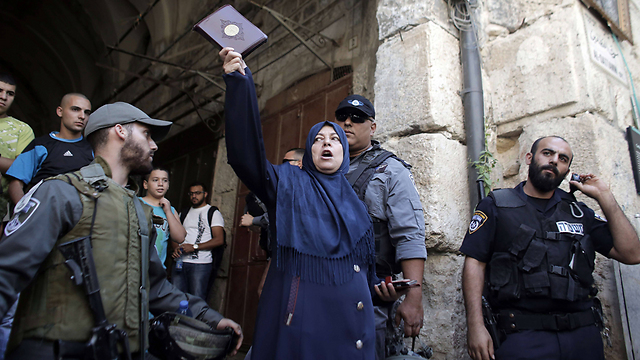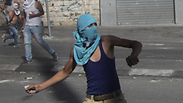
Bad education: How to solve the Jewish and Muslim fight for Jerusalem
Analysis: While Jewish schools teach students about Muslim holy site, Palestinian schools deny any connection between the Jewish people and Jerusalem - completely unlike Muslim leaders of centuries past; Jews and Muslims must work together to fight hatred.
Is the Messianic Judaism movement, a group consisting of a minority and under constant surveillance by the Shin Bet, threatening the mosque's integrity, or is this deliberate propaganda by the Islamic Movement? What exactly is the content of this propaganda? Is this the original Islam's perception? And is there a chance that riots in Jerusalem will become a sequel to the al-Aqsa Intifada that broke out in 2000?
'There was no temple'
An recent article in Palestinian newspaper Al-Hayat Al-Jadida stated that "the parents of Prime Minister Benjamin Netanyahu, who claims that the Jewish people has an ancestral claim on the land of Israel, came from Poland, and neither he nor others have any connection to this land, not even 3,000 years ago. There is no relation to the tribe of Israel, an ancient Arab-Yemenite tribe." The article went on to claim that the Jewish Temple is a Zionist-American invention and that there is no proof of its existence.
Within the Green Line, in Nazareth, an Arabic-language book is printed under the name "The Guide to al-Aqsa: First Direction of Prayer, Second Mosque (in history) and Third in Its Sanctity after the Two Mosques (in Mecca and Medina)". The book is sold at stores and book fairs in Israel and Arab countries, and is likely on the shelf of many Muslim homes.
First, we'll explain the title: According to Muslim tradition, al-Aqsa Mosque was the direction to which the Prophet Muhammad first prayed, before Allah commanded him to change the direction to the Kaaba in Mecca .
Al-Aqsa was the second mosque built in the world after the Kaaba, and is the third holiest in Islam, after the Kaaba and the mosque where the Prophet Muhammed is buried in Medina. In the introduction to the book, Sheikh Raed Salah writes that "there were no churches or Jewish temples before al-Aqsa Mosque. The claim that there was a temple in at the holy site is nonsense. The rights to the holy site of al-Aqsa belong solely to Muslims, and Jews have no rights over even one stone until Judgment Day."
Later, the book's author puts forth several arguments against the existence of the Jewish Temple: First, al-Aqsa was built in the days of the first human, long before the days of King Solomon, and second, there are no remains of Solomon's Temple.
To strengthen his claims, he quotes archaeologist Dr. Eilat Mazar, who said that we apparently have no information about the temple. The author ultimately provides an explanation that contradicts his earlier statements, explaining that in any case Muslims are the most worthy to continue the legacy of David and Solomon, who he says worshiped Allah.
Lest we think this propaganda is confined to Israel, this is far from the case. Even the Arabic-language Wikipedia page on the Jewish Temple claims that archaeologist Israel Finkelstein denies any relation between the Jewish people and Jerusalem – a completely fabricated claim. The same article claims that "according to the Muslim religion, Solomon's Temple does not exist under al-Aqsa Mosque and is a story invented by the Jews as an excuse to destroy the mosque."
One can go online and find questions by Muslims from around the world directed at religious experts about Jerusalem and al-Aqsa. Muslims are well-aware of the fact that they themselves conquered Israel and Jerusalem by force from the Byzantine Empire in the seventh century. According to the Koran, Israel was promised to the people of Israel. According to Muslim tradition, Jacob built al-Aqsa. But according to Islam, the Jews sinned and so lost their right to Israel, and this right was given to those who worship only Allah, meaning Muslims. Regarding the question of which people were in Israel first, the history of the Canaanites is used.
According to the Arab nationalist claim, the Canaanites were an Arab tribe whose origin was in the Arabian Peninsula, and lived in Israel thousands of years before the people of Israel arrived.
Arab complacency
Qatari network al-Jazeera marked recent rioting in al-Aqsa by airing a special segment called "What is required of Arabs and Muslims regarding al-Aqsa?" Analysts and journalist from Iraq, Mauritania, the Palestinian Authority, and Libya weighed on. Their claims were similar in content and accused the Muslim world of complacency towards the crisis and the Palestinian issue in general. The Arab League and the Organization of Islamic Cooperation settle for condemnations and threats that do not affect Israel.
Egypt is accused of tightening the blockade of Gaza instead of aiding the Palestinians. Arab nations have been busy with internal problems since the Arab Spring. Indeed, if we scan media outlets in the Arab world, we find headlines dealing with other issues: The Syrian refugee crisis in Europe, the ISIS threat, the arrival of Russian troops in Syria, the survival of Bashar Assad's regime and the Iranian threat.
Local Arabic newspapers are concerned with varying matters: Egypt is busy with its new government, Lebanon is still dealing with a presidential crisis and garbage removal in Beurit, and the Gulf states are focused on their war in Yemen. Naturally, the country most disturbed by riots at al-Aqsa is Jordan, which has a Palestinian majority in its territory.
Jordanian newspaper Ad-Dustour published a headline quoting Sheikh Raed Salah's claim of an upcoming Third Intifida.
But is he right?
Fears of another intifada
The Arab world is disturbed by the anarchy created by the Arab revolutions and is not interested in further escalation. A conflagration at al-Aqsa could bring destruction like the First Intifada in 1987 and the second in 2000.
Palestinian President Mahmoud Abbas's statements last Wednesday were undoubtedly aimed at Palestinians in East Jerusalem: "A Palestinian state will never be formed without East Jerusalem, which was occupied in 1967." He further said: "The Church of the Holy Sepulchre and al-Aqsa Mosque are ours and we will not let them defile their ground with their filthy feet." Abbas praised the "murabitun", a group of Palestinian activists who have regularly stayed at the mosque area and are supposed to protect it from "desecration".
Despite such statements, there has been much criticism of the fact that in practice, the Palestinian police violently puts down riots that spill from Jerusalem to the West Bank. The concern within the Palestinian Authority is that a third intifada would weaken its rule and that Hamas would exploit this to commit a coup.
In the Arab world, particularly Jordan, there have been attempts to defuse the situation diplomatically through American mediation, as religiously-motivated riots could empower the Muslim Brotherhood and endanger the Hashemite monarchy's rule in Jordan. Some in the Arab-language media have also aimed heavy criticism at Egyptian President Abdel Fattah al-Sisi, who chose this moment to flood the tunnels into Gaza with seawater.
No third intifada is currently on the horizon, and the PA does not, in contrast to Yasser Arafat's PA in 2000, have an interest in starting a conflict. Despite the difficulties of life in the West Bank, they are not interested in their situation deteriorating to one like the Gaza Strip, or even to one like Arabs living under ISIS in Syria and Iraq.
In such an explosive environment, it would be wise for both sides, Jews and Muslims together, to fight the roots of hatred. While in Jewish schools teachers (myself included) teach Jewish students about the sites holy to Muslims and the sites' sensitive nature, in East Jerusalem and the PA leaders, religious leaders, and educators deny any relation between the Jewish people and Jerusalem.
It was the leaders of the medieval Muslim world, like Caliph Omar and Saladin, who were tolerant of Jewish and Christian minorities and allowed Jews to live in Jerusalem and pray at the Temple Mount.
Muhammed ibn Jarir al-Tabari, the greatest Muslim historian in medieval times, noted in his writings the arrival of the Jews in Israel, the kingdoms of David and Solomon, the two temples, and Caliph Omar's decision to found the mosque at the Temple Mount, with consultations by converted Jew Ka'b al-Ahbar, near the former location of the destroyed temple.
Dr. Yaron Friedman, Ynet's commentator on the Arab world, is a graduate of the Sorbonne. He teaches Arabic and lectures about Islam at the Technion, at Beit Hagefen and at the Galilee Academic College. His book, "The Nusayri Alawis: An Introduction to the Religion, History and Identity of the Leading Minority in Syria," was published in 2010 by Brill-Leiden.










